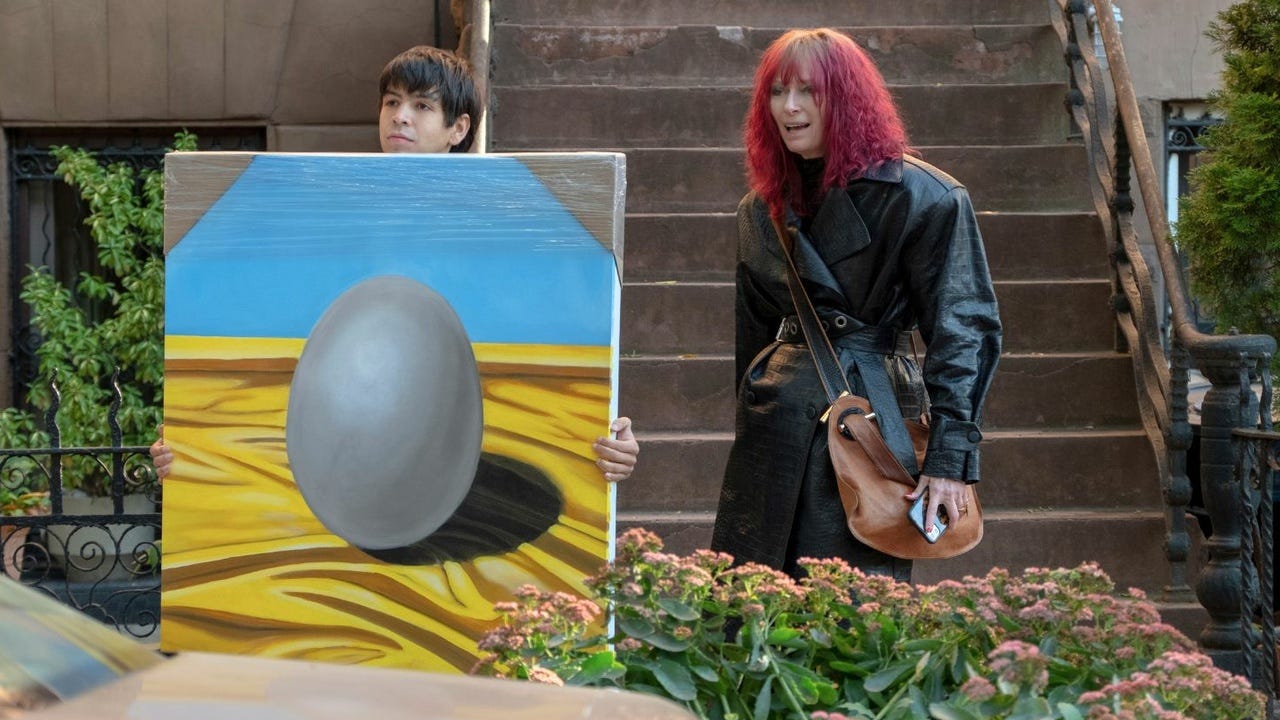Problemista freshly explores coming-of-age
Julio Torres' directorial debut feels wonderfully idiosyncratic
Every story has been told and retold and retold…and retold…and retold some more; thousands of years of narrative can be boiled down, supposedly, into just a handful of broad archetypal conflicts. This realization can feel like an insurmountable obstacle to aspiring writers - how can I possibly contribute anything new? The key is not in what is being told, but how. Chicken is chicken, but ways to prepare it are seemingly endless. Similarly, coming-of-age stories are a dime a dozen, yet we keep finding ourselves drawn to making them and watching them. A filmmaker’s voice is revealed more so in the way they tackle their subject matter, not in the subject matter itself. Julio Torres bravely wrestles with this question in his directorial debut Problemista, a bold (if perhaps narratively simple) exploration of an artist’s struggle to self-actualize not only his work but himself. Torres, who also writes and stars, infuses this struggle with broader cultural and social issues, adding a formal layer of inspired filmmaking choices to give his burgeoning artistic voice remarkable resonance.
Wikipedia labels this film as a work of surrealism, but this characterization doesn’t provide a full enough picture of Torres’ ambitions - a more apt description would recognize the film’s obvious magical realist qualities. The narrative is fairly straightforward - perhaps even a tad thin - but like the best magical realism, Torres’ storyline is injected with seemingly impossible moments taken for granted and at face value by its characters. Individuals struggling to navigate the United States’ immigration system find themselves literally disappearing before each other’s eyes as their visa expires. But then there are also non-diegetic manifestations of abstractions - for example, Craigslist is comically personified as an oracle-esque figure who acts as an intermediary between protagonist Alejandro and potential cash gigs necessary to sustain himself while he’s unable to work legally. Such visual devices are littered throughout the film, but they always feel pointed and practical, rather than shallow, thin, or forced. To be sure, such moments could have been more intentionally diegetic and better integrated into the narrative, but Torres makes this universal struggle - following your dreams, however impossible that may seem - feel wonderfully idiosyncratic.
It’s no surprise that the film feels so strongly conceived; Torres is, after all, a seasoned writer finally moving into the director’s chair. Coming from Saturday Night Live and his own series Los Espookys, Torres channels what are presumably his own experiences into a novel approach to the struggle of living in New York City trying to “make it.” His wit is exacting, garnering several laugh-out-loud moments from me and my audience, priming us for an exciting future for Torres. As mentioned earlier, his narrative is fairly simple, but Torres uses this simplicity as the scaffolding for his creative vision. Alejandro desperately wants to become a toymaker for Hasbro, yet feels locked out of a system not built for him (or, worse, designed to keep him out). I wish that Alejandro’s passion for toy-making was better integrated into the narrative writ large, but the story’s shape, coupled with a brisk pace that always engages and entertains, is clear enough to justify the whimsical nature of it all.
Grounded in all of that whimsy are the two key performances at the film’s center. Torres self-directs himself in a phenomenal display of awkward subtlety, reminiscent of someone like Nathan Fielder. His delightful social ineptitude instantly endears us to this character, with such a bizarre yet lovable speaking cadence and gait. This characterization is in sharp contrast to his mentor (of sorts) Elizabeth. Tilda Swinton brings a chaotic energy to an otherwise unlikable character - to put it bluntly, she is a complete shit-show of a person, neurotic and self-aggrandizing. Her dedication to her cause is admirable, yet her entire aura repels empathy - but perhaps that is the point. On paper, this character should feel like an unqualified parody, ridiculously written to a fault, but Torres’ writing and Swinton’s performance create a textured and fully-realized individual. In fact, some details are so specific that one wonders if Torres used a real person as inspiration (her obsession with a specific administrative software that she herself doesn’t quite understand feels reminiscent of past experiences with frustratingly irrational bosses that we can all relate to). But it’s Elizabeth that gives Alejandro the confidence he needs to assert himself in a world that renders him nearly invisible, making for a touching, if odd, relationship.
Julio Torres finds novelty and originality in an experience that, while real, has become a cinematic cliché. Problemista doesn’t feel like other coming-of-age films - its commitment to a magical surrealism fusion gives Torres’ film a flavor and texture wholly his own. A simple story is buoyed by delightful moments of comic visualizations of abstract situations and of an immigration system that feels designed to keep people out; if you’re able to make it through, it’s because the system failed, not succeeded. But the film never feels dour - it squarely focuses on Torres’ Alejandro, his struggles, and his triumphs. And for that alone - centering a gay Salvadoran toymaker - the film feels unique in a large poool of stories told over and over…and over…








